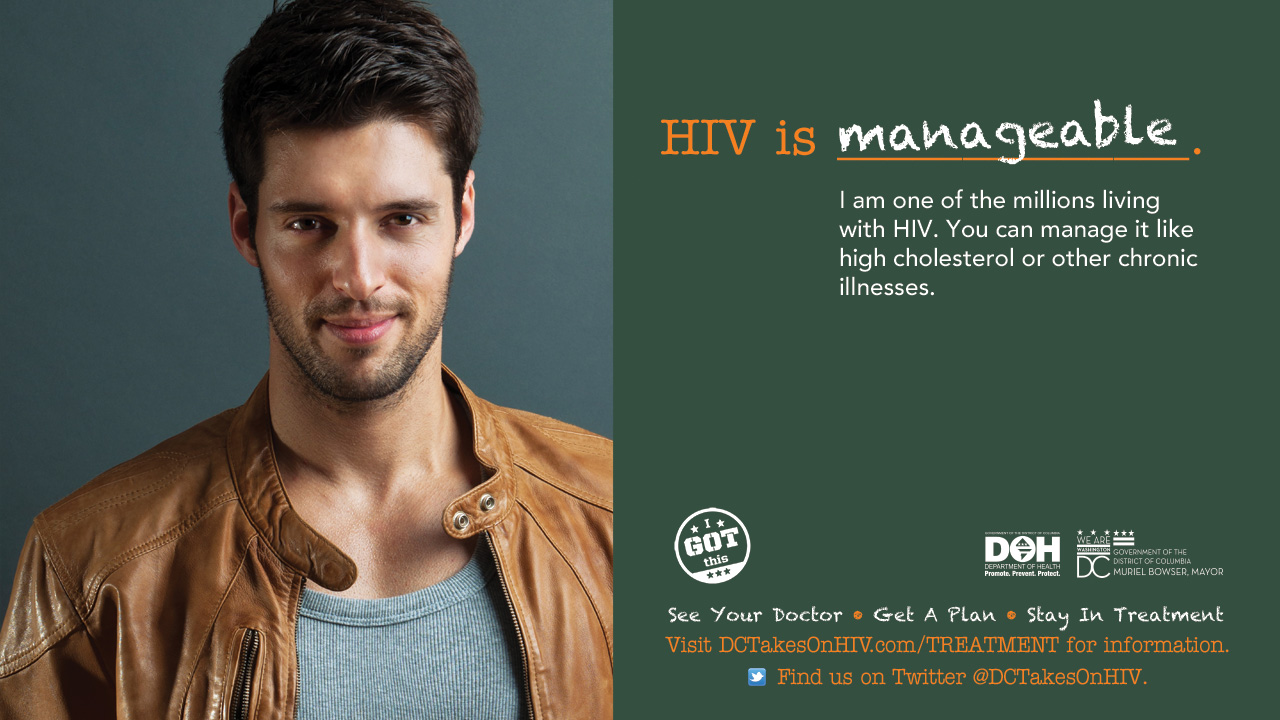DC’S HIV TREATMENT CAMPAIGN
HIV is treatable. It’s manageable. And, most importantly, you are not alone if you have it. With the right treatment and support, people living with HIV have long, healthy, and fulfilling lives. Read on for some important information on how to keep on top of your health when you’re living with HIV.
WHAT TO KNOW
WHAT IS HIV?
HIV stands for human immunodeficiency virus. Human beings get HIV by having sex without a condom with someone who has it or through blood-to-blood contact, like sharing a needle for injectable drugs. It can also be passed from mother to baby, if mom isn’t on medication.
And although there’s no cure for HIV, it’s still treatable and manageable. With treatment, people living with HIV can have long, healthy lives.
WHAT’S THE DIFFERENCE BETWEEN HIV AND AIDS?
HIV is a virus that, if left untreated, can turn into AIDS (acquired immunodeficiency syndrome), which is the most serious stage of the infection. But HIV won’t usually advance to AIDS if a person living with HIV takes their medication.
While HIV may not show any symptoms for up to 10 years, many people have flu-like symptoms two to four weeks after catching the virus. If left untreated, HIV will develop into AIDs after about 10 years. A person living with HIV is diagnosed with AIDS when they’ve lost a certain number of CD4 cells or start getting rare infections or types of cancer. Click here to learn more about the symptoms of AIDS.
WHAT KIND OF MEDICATION IS THERE FOR HIV?
Medication for HIV is called antiretroviral therapy (ART). While they don’t kill HIV, they do prevent its growth. People living with HIV who take their ART consistently and correctly go on to lead long, healthy lives.
Click here for more detailed information about ART.
I have HIV but HIV doesn’t have me.
HOW DO I MAKE SURE I TAKE MY MEDICINE EVERY DAY?
We know that you know it’s important to take your HIV medication every day. But life happens — and sometimes you might miss a dose or two. Don’t beat yourself up about it! Instead, take it as an opportunity to create a plan for making sure you take your medication every day.
Here are some suggestions:
- Take your medication before or after something you already do every day, like brushing your teeth, having your morning coffee, or walking your dog. Associating taking your medicine with a routine will make it easier to remember.
- Make a chart with all the details you need to take your medicine. Then, tape it to your refrigerator or inside your kitchen cabinet or somewhere else you know you’ll look at every day.
- Use a pill box with days and/or times written on each slot so that your medicine is organized and easy to manage. (You can find one at the drugstore or online.)
WHERE SHOULD I KEEP MY MEDICINE?
Keep your medicine in a room you spend a lot of time in. The kitchen is a great spot. Unlike bathrooms — which can get hot and steamy — the temperature in the kitchen remains pretty stable. (Fluctuations in temperature can affect the stability of your meds.) Plus, it’s easy to grab a glass of water to drink with your medicine.

WHAT WILL MY MEDICAL APPOINTMENTS BE LIKE?
It’s important that you see an HIV doctor or infectious disease specialist twice a year. Your regular doctor can suggest someone for you, or you can check with the DC Health and Wellness Center. At your appointment, your doctor will take some tests to find out your CD4 and viral load numbers. Then, you should feel free to ask as many questions as you want. After your appointment, make sure you tell your regular doctor or gynecologist if there are any changes in your HIV medications. (Ideally, the doctors would talk to each other, but sometimes they don’t.)
WHAT IS THE I GOT THIS CAMPAIGN?
“I Got This” is a campaign to support you to see your doctor, get a plan and stay in treatment. We are here for you throughout this journey with options for counseling and health care. We hope that by engaging with us on social media and on our blog you can find a community of support
HOW DO I SPREAD THE WORD ABOUT I GOT THIS?
Follow us on Facebook, Instagram and Twitter and join the conversation!
OTHER HELPFUL RESOURCES
- DC has an AIDS drug assistance program. Call the hotline 202-671-4815 to ask questions.
- If you’re on ART and your status is undetectable you can’t pass on HIV. Learn more.
- Native Washingtonian, Tony Burns, share his experience living with HIV.
- Us Helping Us has a number of support groups for PLWI.


